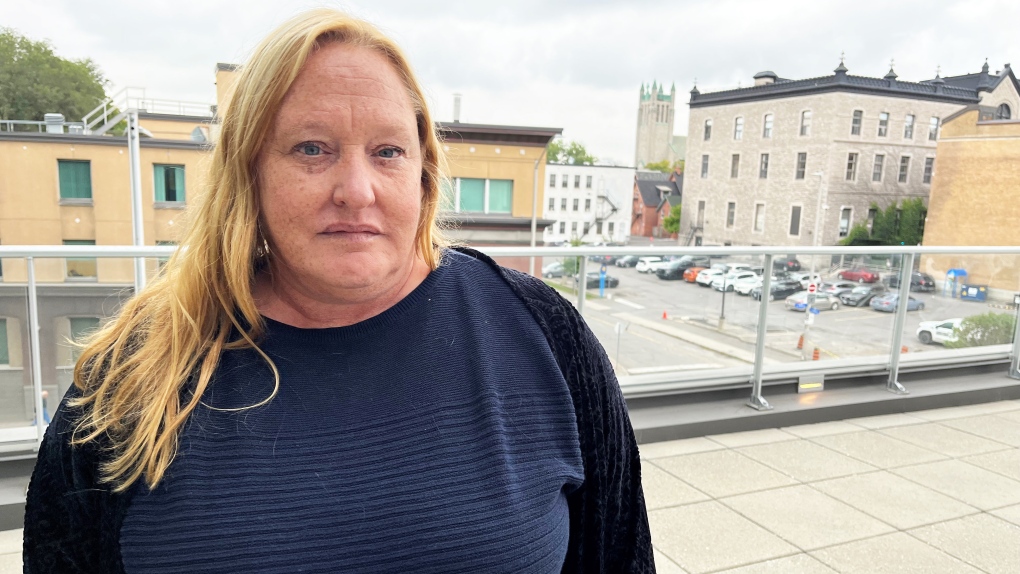News
Right-wing extremism in Canada: anti-hate experts' take – CTV News
Anti-hate experts are urging policy makers to take action against what they describe as growing right-wing extremism in Canada.
One of these experts says research suggests that millions of Canadians have been drawn into the far right over the course of the pandemic, some of whom have been indoctrinated by misinformation and lies that were then amplified by the Freedom Convoy.
Evan Balgord, the executive director of the Canadian Anti-Hate Network, says the convoy’s organizers were able to successfully use the month-long February protest to recruit vaccine-hesitant people into their movement.
“They were now rubbing shoulders with, you know, racists and bigots and people who would like to use violence to overthrow the government. A portion of those people are getting further radicalized.”
GIVING COVER TO EXTREMISTS
Balgord was one of more than a dozen experts who spoke at “Hate Among Us,” an international conference held in Ottawa Tuesday that discussed solutions to growing extremism.
Although some of the Convoy’s leadership is now facing criminal charges, Balgord says the movement’s ideas are entrenched in the mainstream.
Balgord, whose organization tracked right-wing groups and monitored their activities and influence, claims that six years ago there were around 20,000 white supremacists in Canada. That’s not the case anymore, Balgord says.
Balgord estimates that there are now 10 to 15 per cent of Canadians who hold far right views, which encompass a wide range of extremist opinions including anti-government and anti-science perspectives along with racist and homophobic beliefs. Some of them may not consider themselves racist, but they are giving cover to extremists, he says.
A recent Abacus Data survey indicated that 44 per cent of the Canadian population, or 13 million Canadian adults, believe in at least one conspiracy theory. These theories include racist beliefs that political elites are trying to replace native-born Canadians with immigrants who support them, or that the World Economic Forum has a secret strategy to impose its economic plans across the globe.
GAINING POLITICAL POWER
Meanwhile polling data released earlier this month by EKOS Research showed that 25 per cent of Canadians support the anti-vaccine mandate views espoused by Convoy organizers.
In addition to this, Frank Graves, president of EKOS Research, says at least 10 per cent, or more than three million Canadians, view the current government as illegitimate. The supporters are predominately male and under 50 years old, with a high school education. Graves says this group has become a political force in Canada and gravitates toward parties on the right of the spectrum.


The Conservative Party of Canada’s new leader, Pierre Poilievre, has embraced convoy supporters and marched with a Canadian soldier who refused to be vaccinated.
Graves says committed convoy supporters could be a new source of finding success politically.
“But what you need then is to find simply another 10 per cent of voters who are sick to death of the current government…And I think that would provide a successful path to power. I’m not saying it’s a sure thing, but it’s certainly not implausible.”
The far right elements in that 10 per cent of voters who view the government as illegitimate can, in extreme cases, be dangerous or delusional, anti-hate experts say.
That was evident in Coutts, Alta., where RCMP arrested seized weapons and tactical gear from a group that took part in the border blockade. Some members may have had ties to the neo-fascist group Diagolon.
Court documents showed RCMP feared the extremists would shoot to kill officers.


In August, followers of Q-Anon Queen Romana Didulo, who don’t recognize the rule of law, attempted to place police officers in Peterborough, Ont. under citizen’s arrests.
Then two weeks later, Finance Minister Chrystia Freeland was ambushed by a Freedom Convoy supporter who verbally assaulted her.
Stephanie Carvin, a former national security analyst for the Canadian government, says before the pandemic, police were concerned about terrorist attacks from foreign players such as Al Qaida. But as the U.S. learned on Jan. 6 last year during the attack on the Capitol, the risk picture has changed – the dominant threats here are homegrown.


“Jan. 6 changed things in Canada. We’re now not so much worried about bombs. We’re worried about a mob armed with hockey sticks and fire extinguishers charging at the historical parliament buildings,” Carvin said.
In June, the parliamentary protective service issued panic buttons to MPs, some of whom received death threats. Since the pandemic, the threats have become more pervasive, personal and tougher to guard against, says Carvin, who now teaches at Carleton University in Ottawa.
“It’s a much more dangerous situation when people see politicians as legitimate targets for violence.”
POLITICAL AND PUBLIC SOLUTIONS
To counter this growing threat to democracy, Heidi Beirich of U.S.-based Global Project Against Hate and Extremism, says the extremists are exploring real grievances like job losses and rising costs of living that policy makers need to address. She says Canada should pass a digital accountability law that forces social media companies to clamp down on disinformation shared on their platforms.
Bierich says community groups can organize to fight back against the hateful movement. An example is Ottawa’s “Battle of Billings Bridge” in February this year, where concerned residents blocked a roadway for hours, preventing a convoy of vehicles from joining the trucker protest that occupied Parliament Hill.


“This is a situation where we have a growing far right movement that’s a threat to a lot of things: climate change, racial injustice and sound immigration policies. The list could go on,” Bierich said.
Beirich added that it’s important for media to continue reporting on the far right and its views.
“It’s not a question of giving them oxygen. They’ve got the oxygen. The question now is are they being appropriately examined and interrogated by the press about their beliefs and ideas so other people can be inoculated from their views.”
News
Canada Child Benefit payment on Friday | CTV News – CTV News Toronto



More money will land in the pockets of Canadian families on Friday for the latest Canada Child Benefit (CCB) installment.
The federal government program helps low and middle-income families struggling with the soaring cost of raising a child.
Canadian citizens, permanent residents, or refugees who are the primary caregivers for children under 18 years old are eligible for the program, introduced in 2016.
The non-taxable monthly payments are based on a family’s net income and how many children they have. Families that have an adjusted net income under $34,863 will receive the maximum amount per child.
For a child under six years old, an applicant can annually receive up to $7,437 per child, and up to $6,275 per child for kids between the ages of six through 17.
That translates to up to $619.75 per month for the younger cohort and $522.91 per month for the older group.
The benefit is recalculated every July and most recently increased 6.3 per cent in order to adjust to the rate of inflation, and cost of living.
To apply, an applicant can submit through a child’s birth registration, complete an online form or mail in an application to a tax centre.
The next payment date will take place on May 17.
News
Capital gains tax change draws ire from some Canadian entrepreneurs worried it will worsen brain drain – CBC.ca
A chorus of Canadian entrepreneurs and investors is blasting the federal government’s budget for expanding a tax on the rich. They say it will lead to brain drain and further degrade Canada’s already poor productivity.
In the 2024 budget unveiled Tuesday, Finance Minister Chrystia Freeland said the government would increase the inclusion rate of the capital gains tax from 50 per cent to 67 per cent for businesses and trusts, generating an estimated $19 billion in new revenue.
Capital gains are the profits that individuals or businesses make from selling an asset — like a stock or a second home. Individuals are subject to the new changes on any profits over $250,000.
The government estimates that the changes would impact 40,000 individuals (or 0.13 per cent of Canadians in any given year) and 307,000 companies in Canada.
However, some members of the business community say that expanding the taxable amount will devastate productivity, investment and entrepreneurship in Canada, and might even compel some of the country’s talent and startups to take their business elsewhere.
Finance Minister Chrystia Freeland unveiled the government’s 2024 federal budget, with spending targeted at young voters and a plan to raise capital gains taxes for some of the wealthiest Canadians.
Benjamin Bergen, president of the Council of Canadian Innovators (CCI), said the capital gains tax has overshadowed parts of the federal budget that the business community would otherwise be excited about.
“There were definitely some other stars in the budget that were interesting,” he said. “However, the … capital gains piece really is the sun, and it’s daylight. So this is really the only thing that innovators can see.”
The CCI has written and is circulating an open letter signed by more than 1,000 people in the Canadian business community to Trudeau’s government asking it to scrap the tax change.
Shopify CEO Tobi Lütke and president Harley Finkelstein also weighed in on the proposed hike on X, formerly known as Twitter.
We need to be doing everything we can to turn Canada into the best place for entrepreneurs to build 🇨🇦<br><br>What’s proposed in the federal budget will do the complete opposite. Innovators and entrepreneurs will suffer and their success will be penalized — this is not a wealth tax,…
—@harleyf
Former finance minister Bill Morneau said his successor’s budget disincentivizes businesses from investing in the country’s innovation sector: “It’s probably very troubling for many investors.”
Canada’s productivity — a measure that compares economic output to hours worked — has been relatively poor for decades. It underperforms against the OECD average and against several other G7 countries, including the U.S., Germany, U.K. and Japan, on the measure.
Bank of Canada senior deputy governor Carolyn Rogers sounded the alarm on Canada’s lagging productivity in a speech last month, saying the country’s need to increase the rate had reached emergency levels, following one of the weakest years for the economy in recent memory.
The government said it was proposing the tax change to make life more affordable for younger generations and fund efforts to boost housing supply — and that it would support productivity growth.
A challenge for investors, founders and workers
The change could have a chilling effect for several reasons, with companies already struggling to access funding in a high interest rate environment, said Bergen.
He questioned whether investors will want to fund Canadian companies if the government’s taxation policies make it difficult for those firms to grow — and whether founders might just pack up.
The expanded inclusion rate “is just one of the other potential concerns that firms are going to have as they’re looking to grow their companies.”


He said the rejigged tax is also an affront to high-skilled workers from low-innovation sectors who might have taken the risk of joining a startup for the opportunity, even taking a lower wage on the chance that a firm’s stock options grow in value.
But Lindsay Tedds, an associate economics professor at the University of Calgary, said the tax change is one of the most misunderstood parts of the federal budget — and that its impact on the country’s talent has been overstated.
“This is not a major innovation-biting tax change treatment,” Tedds said. “In fact, when you talk to real grassroots entrepreneurs that are setting up businesses, tax rates do not come into their decision.”
As for productivity, Tedds said Canadians might see improvements in the long run “to the degree that some of our productivity problems are driven by stresses like housing affordability, access to child care, things like that.”
‘One foot on the gas, one foot on the brake’
Some say the government is sending mixed messages to entrepreneurs by touting tailored tax breaks — like the Canada Entrepreneurs’ Incentive, which reduces the capital gains inclusion rate to 33 per cent on a lifetime maximum of $2 million — while introducing measures they say would dampen investment and innovation.
“They seem to have one foot on the gas, one foot on the brake on the very same file,” said Dan Kelly, president of the Canadian Federation of Independent Business.
Some business groups are worried that new capital gains tax changes could hurt economic growth. But according to Small Business Minister Rechie Valdez, most Canadians won’t be impacted by that change — and it’s a move to create fairness.
A founder may be able to sell their successful company with a lower capital gains treatment than otherwise possible, he said.
“At the same time, though, big chunks of it may be subject to a higher rate of capital gains inclusion.”
Selling a company can fund an individual’s retirement, he said, which is why it’s one of the first things founders consider when they think about capital gains.
Mainstreet NS7:03Ottawa is proposing a hike to capital gains tax. What does that mean?
Tuesday’s federal budget includes nearly $53 billion in new spending over the next five years with a clear focus on affordability and housing. To help pay for some of that new spending, Ottawa is proposing a hike to the capital gains tax. Moshe Lander, an economics lecturer at Concordia University, joins host Jeff Douglas to explain.
Dennis Darby, president and CEO of Canadian Manufacturers & Exporters, says he was disappointed by the change — and that it sends the wrong message to Canadian industries like his own.
He wants to see the government commit to more tax credit proposals like the Canada Carbon Rebate for Small Businesses, which he said would incentivize business owners to stay and help make Canada competitive with the U.S.
“We’ve had a lot of difficulties attracting investment over the years. I don’t think this will make it any better.”
Tech titan says change will only impact richest of the rich


Toronto tech entrepreneur Ali Asaria will be one of those subject to the expanded capital gains inclusion rate — but he says it’s only fair.
“It’s going to really affect the richest of the rich people,” Asaria, CEO of open source platform Transformer Lab and founder of well.ca, told CBC News.
“The capital gains exemption is probably the largest tax break that I’ve ever received in my life,” he said. “So I know a lot about what that benefit can look like, but I’ve also always felt like it was probably one of the most unfair parts of the tax code today.”
While Asaria said Canada needs to continue encouraging talent to take risks and build companies in the country, taxation policies aren’t the most major problem.
“I think that the biggest central issue to the reason why people will leave Canada is bigger issues, like housing,” he said.
“How do we make it easier to live in Canada so that we can all invest in ourselves and invest in our companies? That’s a more important question than, ‘How do we help the top 0.13 per cent of Canadians make more money?'”
News
Canada Child Benefit payment on Friday | CTV News – CTV News Toronto



More money will land in the pockets of Canadian families on Friday for the latest Canada Child Benefit (CCB) installment.
The federal government program helps low and middle-income families struggling with the soaring cost of raising a child.
Canadian citizens, permanent residents, or refugees who are the primary caregivers for children under 18 years old are eligible for the program, introduced in 2016.
The non-taxable monthly payments are based on a family’s net income and how many children they have. Families that have an adjusted net income under $34,863 will receive the maximum amount per child.
For a child under six years old, an applicant can annually receive up to $7,437 per child, and up to $6,275 per child for kids between the ages of six through 17.
That translates to up to $619.75 per month for the younger cohort and $522.91 per month for the older group.
The benefit is recalculated every July and most recently increased 6.3 per cent in order to adjust to the rate of inflation, and cost of living.
To apply, an applicant can submit through a child’s birth registration, complete an online form or mail in an application to a tax centre.
The next payment date will take place on May 17.
-
Media17 hours ago
DJT Stock Rises. Trump Media CEO Alleges Potential Market Manipulation. – Barron's
-
Media19 hours ago
Trump Media alerts Nasdaq to potential market manipulation from 'naked' short selling of DJT stock – CNBC
-
Investment18 hours ago
Private equity gears up for potential National Football League investments – Financial Times
-
Real eState10 hours ago
Botched home sale costs Winnipeg man his right to sell real estate in Manitoba – CBC.ca
-



 Sports22 hours ago
Sports22 hours ago2024 Stanley Cup Playoffs 1st-round schedule – NHL.com
-
News16 hours ago
Canada Child Benefit payment on Friday | CTV News – CTV News Toronto
-
Business18 hours ago
Gas prices see 'largest single-day jump since early 2022': En-Pro International – Yahoo Canada Finance
-
Art21 hours ago
Enter the uncanny valley: New exhibition mixes AI and art photography – Euronews







